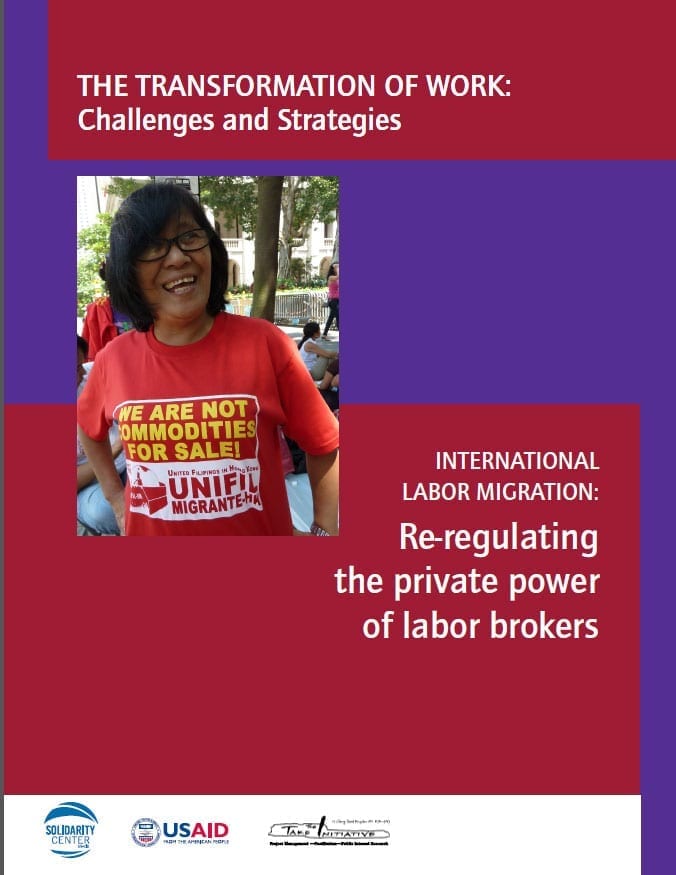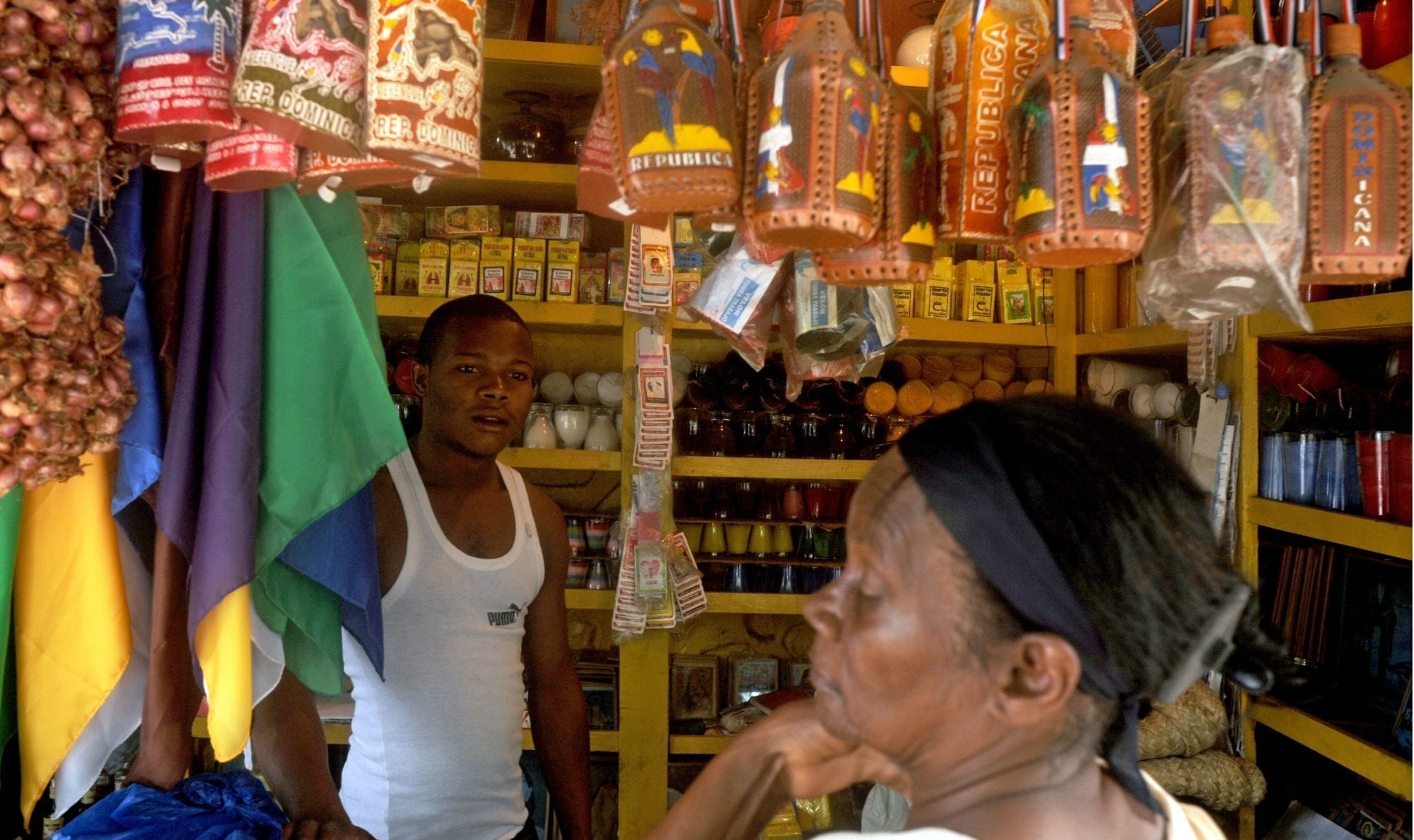
Aug 4, 2015
More than 300,000 domestic workers in Hong Kong, Special Administrative Region of China have migrated from the Philippines, Indonesia and other Southeast Asian countries seeking jobs to support their families. Recent high-profile instances of employer abuse against these domestic workers—unpaid wages, 24/7 working hours, and even physical assault—offer a glimpse into the migrant crisis that recently has focused the world’s attention on longstanding issues of debt bondage, human trafficking and mistreatment of workers striving to earn a decent living in the region.
But when they face an abusive work situation in Hong Kong, SAR, migrant domestic workers—nearly all of whom are women—have an opportunity for strong support through the Federation of Asian Domestic Workers Union (FADWU).
“We help them file a case with the Labor Department because, as a union, we can have the right of representation in a tribunal,” says Leo Tang, organizing secretary for the Hong Kong Confederation of Trade Unions (HKCTU), which includes FADWU as an affiliate. “Sometimes we provide shelter to those in need.”
Solidarity Center Labor Migration Conference
Tang is among more than 200 migrant worker rights experts taking part in the Solidarity Center’s Labor Migration conference in Indonesia, August 10–12. Conference participants will strategize within themes that focus on labor recruitment reform; organizing; and migrant worker access to justice.
Assisting workers first requires reaching out to them before they need support. That’s why organizing domestic workers is fundamental for the five unions that comprise FADWU. Based on nationality, the unions provide a cultural meeting ground that extends to education and training about their rights on the job.
Tang now is taking the members to the next step: shaping an inclusive union. “We are trying to unite all nationalities, all the migrants, under the federation structure,” he says.
In Mexico, where 10 percent of domestic workers migrate from countries such as Honduras and Peru, the Center of Support and Training for Domestic Workers (CACEH), reaches out to these workers to educate them about their rights.
“They have no information,” says CACEH leader Marcelina Bautista. “Often what happens is that their employer starts to retain their salaries to pay back the air ticket cost (the employer) spent bringing them to Mexico,” she said, speaking through a translator. Bautista, who also serves as International Domestic Workers Federation (IDWF) regional coordinator for Latin America, also will share her insights at the Solidarity Center event, “Labor Migration: Who Benefits? A Global Conference on Worker Rights and Shared Prosperity
CACEH, which Bautista founded 15 years ago, now has an extensive word-of-mouth network that enables them to organize domestic workers. CACEH also provides education services and train-the- trainer workshops that further expand the organization’s connection with domestic workers.
Market Vendors Join Forces to Improve Their Lives
In the Dominican Republic, where 60 percent of the workforce labors in the informal economy, Pablo de los Santos, president of National Federation of Sellers and Market Workers, says organizing market sellers involves letting them know about the disadvantages they face as self-employed individuals.
“I tell them about the advantages they could have once they organize themselves: better working conditions, living conditions, better benefits, for themselves and their families,” he said, speaking through a translator. Up to 60 percent of informal workers in the Dominican Republic are migrant workers, primarily from Haiti.
The organization, which started out in 2007 with a pilot program and now has branches in all 32 states, has sufficient bargaining power that it convinced banks to give 1 percent loans to dozens of informal economy workers, an achievement individual sellers often unattainable. The federation also negotiated improved infrastructure in Santo Domingo’s bustling open markets, and is seeking more space for Haitian workers.
Like Santos, Bautista is looking forward to taking part in the Solidarity Center labor migration conference to improve the ability of her organization to help workers. “It is very important to learn from the experience of all the other domestic workers who work in migration, especially colleagues who work in Asia and the United States, because they have a lot of experience working with migrant workers,” she says.
Follow Labor Migration: Who Benefits? at the Solidarity Center website and on Twitter @SolidarityCntr.
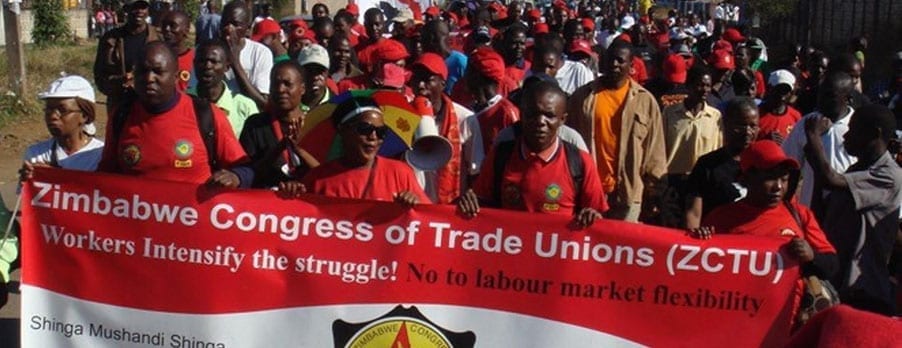
Jul 22, 2015
The Supreme Court of Zimbabwe upheld a decision late last week stating that companies can now terminate workers’ contracts at any time, without offering them layoff benefits, by giving them three months’ notice.
The unanimous decision “has grave consequences for anyone under formal employment,” according to one news source and comes “at time when business is crying for flexible labor laws in order to improve industrial competitiveness,” according to another analysis. Employers often use the term “flexible” as a euphemism to describe workplace policies that benefit management at the expense of working people.
Noting that many jobs already have been lost in the days after the court ruling, the Zimbabwe Congress of Trade Unions (ZCTU) said in a statement that the judicial action is the latest in a series to “casualize” workers—that is, create an environment in which formal-sector workers, like those working in the informal economy, have few workplace rights
“The ruling will have an adverse effect of destroying the gains achieved over the past 35 years, with far-reaching economic” consequences, ZCTU said. Zimbabwe’s union movement is planning street protests until the government takes action to resolve the issue.
The case was brought by Kingstone Donga and Don Nyamande, who cited unfair dismissal and contract termination by their former employer, Zuva Petroleum. The employees argued that the Labor Relations Act had abolished the employer’s common law right to terminate an employment contract on notice. The court agreed with the employer.
More than 72 percent of Zimbabweans live in poverty, and the vast majority of the country’s nearly 15 million people are not employed in the formal economy. Rather than creating opportunities for stable, decent jobs in the formal sector, the ruling creates further economic destabilization.
Under Zimbabwe’s Labor Act, “every employee has the right not to be unfairly dismissed,” and the law details the process employers must follow when seeking to terminate an employee.
One analyst notes that employers will still need to exercise caution when they terminate employment on notice because there is still scope for them to be challenged on grounds of unfair dismissal. For example, a group of employees fired when pregnant would have cause to bring a discrimination suit for unfair dismissal.
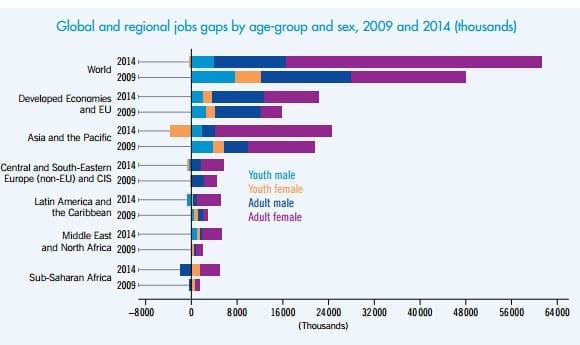
May 19, 2015
More than 60 percent of workers worldwide, predominantly women, are in temporary, part-time or short-term jobs in which wages are falling, a growing trend that is fueling global income inequality and poverty, according to an International Labor Organization (ILO) report released today.
“This report reveals a shift away from the standard employment model, in which workers earn wages and salaries in a dependent employment relationship vis-à-vis their employers, have stable jobs and work full time,” the report states. Further, “labor incomes constitute the main source of income inequality.”
Although the incomes of permanent workers are relatively stable, the percentage of such workers is declining globally—and as few as 20 percent of workers are in permanent jobs in regions such as sub-Saharan Africa and South Asia. Many of these precarious jobs are in the informal economy, which includes market vendors, day laborers, pedicab drivers and domestic workers. In fact, domestic workers, most of whom are women, represent 3.6 percent of wage employment worldwide, the report says.
“World Employment and Social Outlook: The Changing Nature of Jobs” cites a shortage in global aggregate demand as a potentially key factor in explaining the slow growth of decent jobs, which has created a global jobs gap that costs an estimated $1.218 trillion in lost wages for workers around the world. The ILO estimates that 201 million women and men were out of work in 2014, more than 30 million higher than before the start of the 2008 global economic crisis.
“A vicious circle may be at work, with lower demand affecting output and employment, thereby further depressing demand,” the report states. In other words, fewer jobs and lower wages mean workers and their families will be able to purchase less, and so fewer jobs will be created and low-pay will be the norm, a vicious cycle that can only be broken by large-scale job creation and incomes that sustain working people and their families.
Workers making low pay are less likely to be union members or to benefit from collective bargaining, according to the report. Further, despite widespread unemployment, in particular among women, there is very limited social protection for unemployed working-age adults. The report recommends policy changes that address the transformation in employment structures and include the growing numbers of precarious workers in social protection systems.
The report also notes that approximately 1 in 5 workers contribute to global supply chains, which “facilitates transitions to the formal economy and waged employment for many workers.” However, the study equally highlights that the vast majority of employment in the global supply chain takes place under poor working conditions. This is particularly the case for vulnerable workers, such as unskilled women, youth and migrant workers.
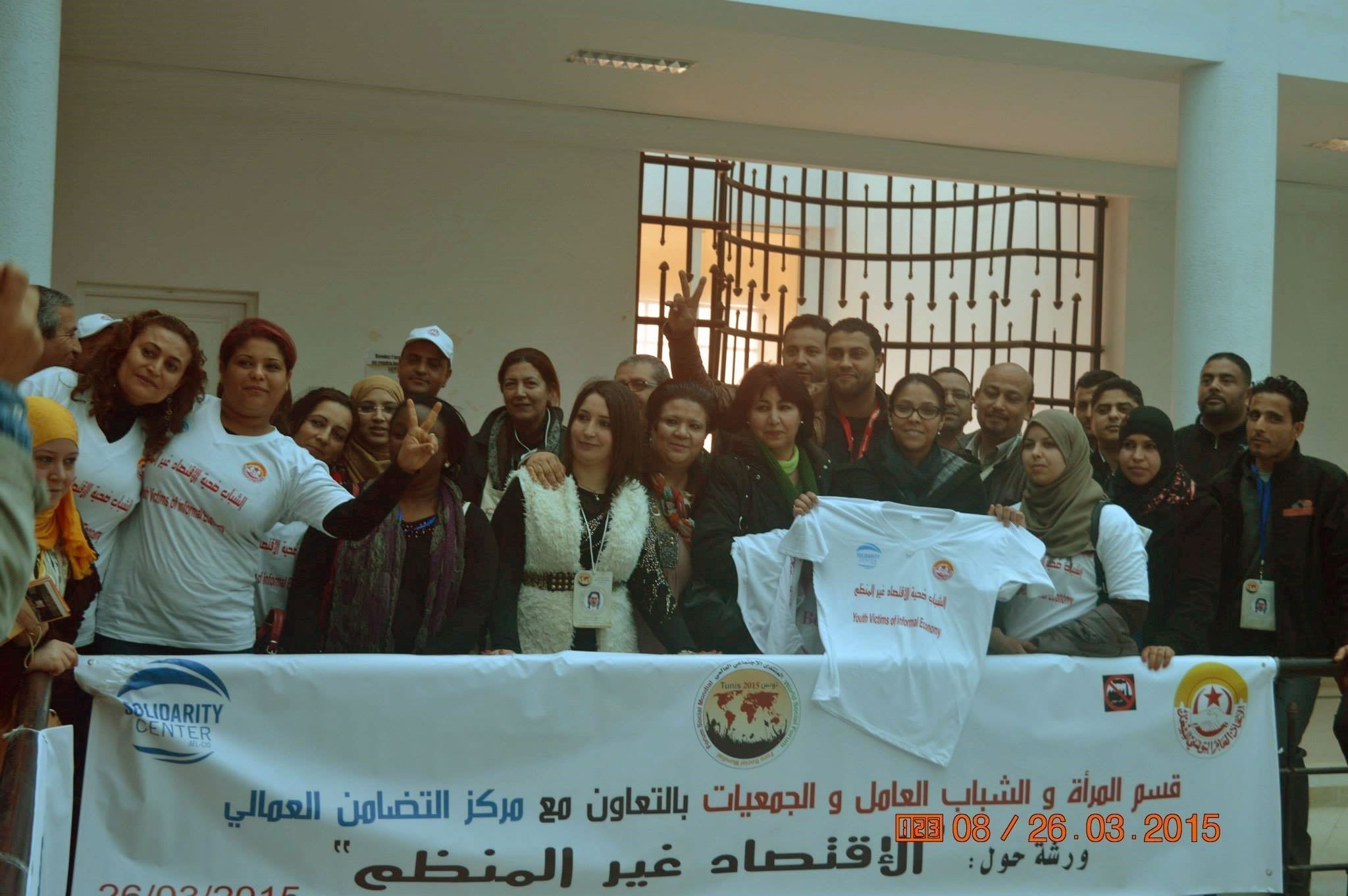
Mar 30, 2015

Maher Dribik was among presenters at the UGTT National Youth Workers Commission workshop on informal economy workers. Credit: Lassaad Mahmoudi
More than 60 worker advocates shared strategies for empowering workers, especially women and young workers, trapped in informal economy jobs during last week’s World Social Forum in Tunis, Tunisia. Sponsored by the National Youth Workers Commission of the General Union of Tunisian Workers, (Union Générale Tunisienne du Travail, UGTT), together with the Solidarity Center, the workshop brought together representatives of European, Asian and Arab civil society organizations.
During the half-day workshop, the Youth Workers Commission shared a report on informal economy workers in Tunisia the UGTT released last year. The report found that 67 percent of Tunisian workers in the informal economy do not benefit from social protections such as paid sick leave, and pointed out that the informal economy is growing, accounting for 38 percent of Tunisia’s gross domestic product (GDP) in 2013, compared with 30 percent in 2010.
Workshop participants suggested the need for employers, workers and the government to work together to define a new development model; reform programs covering social protections; and encourage a sense of citizenship among workers and employers in the informal economy. The workshop also served to build and strengthen alliances between civil society organizations and trade unions.
Some 70,000 participants, representing more than 4,000 organizations took part in the World Social Forum. The five-day event serves as an annual counterweight to the Davos World Economic Forum, where top political leaders and business elites meet to discuss economic issues.



